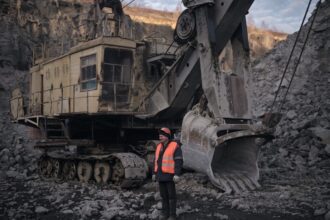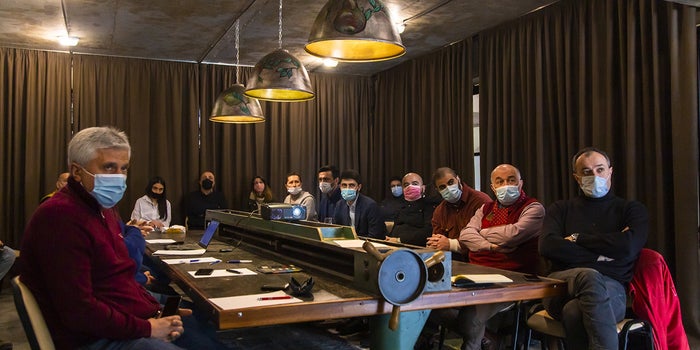The Center for New Technologies, in conjunction with CENN and Esco-Es hosted winemakers on March 16 at the Bazaleti Center for Green Technology. The Green Economy Program was launching its first seminar, which aims at promoting energy-efficient and renewable energy production technologies and their utilization in various industries. Esco-ES representatives Archil Papava, Givi Jakeli and others also spoke about innovative technologies and projects. Levan Natadze from the Green Council of Georgia discussed “green production niches”, the winemaking procedures and funding opportunities for the winemakers. He gave the attending businesspeople information about the specific technology consumed by the wine industry. Jakeli, in a conversation with Entrepreneur, noted that “green” architecture (sustainable) has developed around the world. This implies not only a specific discipline, but a unified philosophy and approach to life and the environmental. “Green technologies are being introduced in Georgia and the state should be supporting their spread as much possible,” he stated. “Some of the technology shown today will be demonstrated to program participants by the end May 2021. We will provide concrete examples.” According to Zaal Kheladze of the Center for New Technologies’ slogan, “From Traditions to Innovation,” all traditions contain innovation. “If we remember technologies that have been lost, it will be beneficial for our business.” He said that specialists helped us get energy-efficient materials which were compressed with technology and then used in construction. “Normally, this waste would be thrown away, but we use it for different materials to build with,” he explained. One of the directions of these workshops is the production of renewable energies which has proven to be particularly relevant for winemakers. The biomass is produced by viticulture, winemaking and vine grains, and is called “pressed chacha”. This fuel can be used for industrial purposes and is cheap. “Businesses are not interested in technologies that are more expensive than traditional ones, but there are also other factors to consider: business responsibility, waste reduction, emissions reduction, and compliance with environmental standards. “Today, this is a condition for success on the European market. We hope that our national legislation will encourage such decisions.” “Our offers are based on reducing operating and investment costs, while at the same time increasing indirect benefits, preventing losses and minimizing risks. We could not, for example, suggest that a winery produce fuel briquettes using vine husks or dry grape waste because it wouldn’t be profitable. We can, however, offer an oven which consumes chips made of the same raw materials, thus providing the wine production process cheaper consumable energy. This will also solve the waste problem and establish the image of “green product” producers in the local and European markets,” continues Kheladze. “Unfortunately, energy pressure is a major factor that has contributed to deforestation of Georgia for many years. This continues today. We need to find alternatives for firewood in the private and public sectors. Responsible businesses can play an important role in this process. This is not just because “green technologies are more accessible for business. This is already a trend for the sale of own products. Our special interest in viticulture is due to the large amount biomass that is accumulated every year as waste and wine production, which is then disposed of. We are interested in the production of chips using this raw material, not only because it is an energy-saving measure, but also because it can be used for commercial purposes. The introduction of this business experience will serve as a good example for rural households and play a part in the implementation of rural solutions for energy. The project that was implemented in February of this year by CENN and NTC, which provided modern heating systems to all schools in Keda Municipality in Adjara, is a good example of the cooperation between CENN & NTC. The project was funded by the European Union and Austria. Solar panels, collectors, energy-efficient stoves and boilers, thermal insulation, and safety technologies have been installed. This allows for more energy to generated with fewer resources. The winemakers agree that these technologies must be economically viable and do not generate losses. “On the contrary, these technologies will bring lower costs to consumers.” In some cases, incentive legislation can be effective in encouraging businesses to innovate. It also means less environmental damage, which is a natural part of traditional entrepreneurship, both in Georgia and worldwide,” he says. “Today was a pilot day and an attempt to change the building’s energy efficiency to industrial. From today’s perspective, this is clearly promising.” In the future, it will be important to demonstrate this in action. The Bazaleti Demonstration Center was also created for this purpose. It should be able exist as a company and be appealing to different industries. We plan to meet with experts in agriculture and medicine in the near future” continues Kheladze.. The Bazaleti Center for Engineering Technologies will open in May, after which trainings and seminars will become more intensive.
Read More @ georgiatoday.ge













